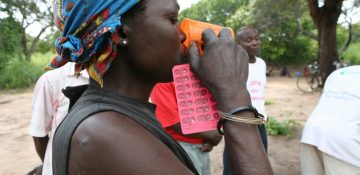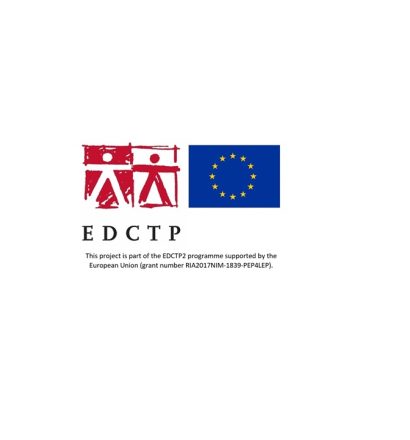PEP4LEP & PEP4LEP 2.0
The projects PEP4LEP & PEP4LEP 2.0 aim to identify the most effective and feasible method for screening people at risk of developing leprosy and administering chemoprophylaxis, in Ethiopia, Mozambique and Tanzania.

Chemoprophylaxis for persons affected by leprosy: comparing two intervention types
While some bacteria multiply every minute, the leprosy bacillus only doubles once every two weeks. Consequently, it may take as long as two to five years before a person affected by leprosy develops symptoms. Also, leprosy symptoms, like skin lesions with impaired sensation, are often not recognized or responded to in a timely manner by person affected by leprosy and health care workers. As a result, an infected person may spread the bacilli for years without knowing. To stop transmission, an innovative, head-on approach is required.
A single dose of rifampicin (also known as SDR-PEP) has been proven to reduce the risk of developing leprosy by nearly 60% when administered to contacts of people affected by leprosy. Although the WHO incorporated this post-exposure prophylaxis treatment in the latest guidelines (WHO 2018), little is known about the most feasible implementation method.
PEP4LEP & PEP4LEP 2.0 are research projects (cluster-randomized implementation trials) which compare the effectiveness and feasibility of a skin camp intervention to a health centre-based intervention in Mozambique, Ethiopia, and Tanzania. To avoid stigma, participants in the studies are not only screened for leprosy, but also for other skin diseases. This dermatological screening process is an evidence based and WHO supported method to detect leprosy. The comparison of two study interventions is made by analysing patient detection rates, delays in case detection, cost-effectiveness, and acceptability by stakeholders.
- One study intervention is community based, using so-called “skin camps” to screen around 100 contacts (household members and neighbours) of a person affected by leprosy (index patient) and provide them with a single dose of rifampicin when eligible.
- The other intervention is health centre based, inviting the household contacts of a person affected by leprosy (index patient) to be screened in a health centre, and also to be given a single dose of rifampicin when eligible.
In both studies, the NLR SkinApp is used and tested for acceptability by health workers and contacts of persons affected by leprosy. NLR developed the SkinApp as there is a dermatologist shortage in sub-Saharan Africa. The NLR SkinApp aims to support community health workers to recognize the early signs and symptoms of leprosy, and other skin diseases, so that treatment can start immediately. By enabling timely diagnosis and treatment, the NLR SkinApp contributes to the prevention of disabilities as well as psychological and socio-economic problems like stigma. The app has now also been integrated into the WHO Skin NTD App, which is a great achievement!
As part of these projects, health workers will receive training in diagnosing leprosy and other skin diseases, as well as in administering SDR-PEP. A capacity assessments will be conducted continuously, testing the effect of skin screening capacity building initiatives, such as the NLR SkinApp, for enrolled community health workers.
The PEP4LEP project started on the 1st of October 2018 and was finalised in March 2024. PEP4LEP project results, publications, tools and newsletters can be found here!
PEP4LEP was financed by the European & Developing Countries Clinical Trials Partnership (EDCTP2 / EU) and the Leprosy Research Initiative (LRI), and the funding for PEP4LEP2.0 is provided by the Global Health EDCTP3 Joint Undertaking (GH EDCTP3 JU) / EU.

PEP4LEP 2.0 – the story continues
As COVID-19 caused project delays, a follow-up project was granted by the Global Health EDCTP3 Joint Undertaking (GH EDCTP3 JU) / EU, With this new project, we continue the work which was part of PEP4LEP, but will add 25% to the original PEP4LEP sample size. An additional PEP4LEP 2.0 objective is to better understand and overcome the effect of the COVID-19 delays on the PEP4LEP study to ensure the impact original anticipated remains within reach. Furthermore, additional mathematical modelling will take place to gain more insights in the full effects of the project. The PEP4LEP 2.0 consortium also hopes to publish on the prevalence of skin diseases seen and the organisation process of the skin camps.
PEP4LEP 2.0 project partners
- NLR, the Netherlands (Coordinator)
- DAHW Deutsche Lepra- und Tuberkulosehilfe e. V., Germany
- Erasmus Universitair Medisch Centrum Rotterdam (Erasmus MC), the Netherlands
- Catholic University of Health and Allied Sciences-Bugando (CUHAS), United Republic of Tanzania
- Armauer Hansen Research Institute (AHRI), Ethiopia (Scientific lead)
- The project also works closely together with the Ministries of Health in Ethiopia, Mozambique and Tanzania.


